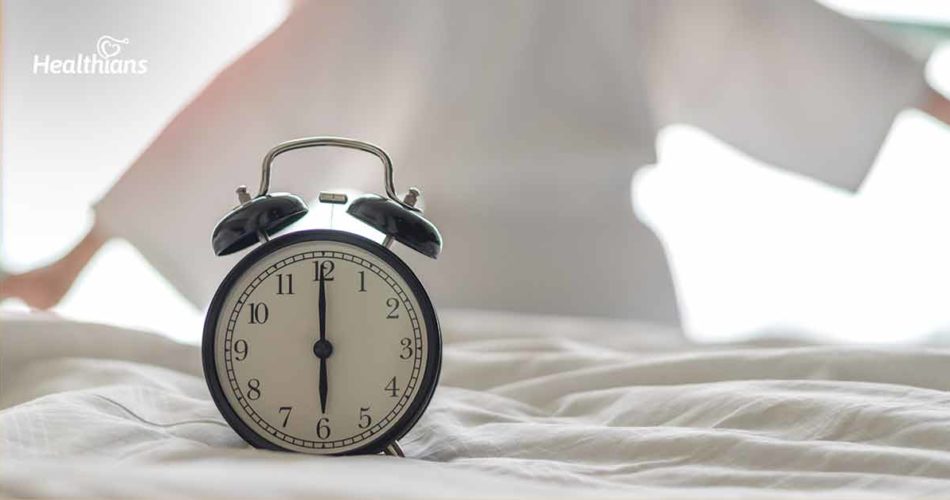Contributed by: Healthians Team
Introduction
In the fast track current lifestyle, an increase in activities that operate 24×7 and the common usage of electronic devices almost 24 hours a day has caused a deterioration of the sleep-wake cycle.
The circadian rhythm is the name given to this natural sleep-wake cycle. A circadian rhythm sleep problem occurs when this rhythm is not properly aligned with your environment and interferes with your daily activities. When your circadian rhythm is disrupted, it can impact many facets of your life.
In this blog, we will discuss an overview, its clinical features, and diagnostic criteria of circadian sleep-wake rhythm disorders.
FAQ #1: What are circadian rhythm disorders?
Circadian rhythm sleep disorders are a group of sleep disorders that occur when the internal sleep-wake rhythms (body clock) does not align with the external light (day)-darkness (night) cycle.
FAQ #2: What is the cause of circadian rhythm disorder?
Circadian rhythm sleep disorders are caused when the internal sleep-wake rhythms and the light-darkness cycle are out of sync with one another. The cause of this mismatch may be due to continuous or occasional disruption of sleep patterns.
This could be internal (for example, delayed or advanced sleep phase syndrome) or external (for example, jet lag, working in shifts).
FAQ #3: Who is at most risk for circadian rhythm disorders?
Disruptions in sleep patterns may occur in patients with:
- Alzheimer disease
- Parkinson disease
- Head trauma
- Encephalitis
FAQ #4: What is the impact of circadian rhythm sleep disorders on daily health and well-being?
Alterations in sleep caused due to circadian rhythm sleep disorders may cause:
- Insomnia
- Nausea
- Malaise
- Irritability
- Depression
- Impaired performance, including lower cognitive skills
- Poor coordination
- Headaches
- Stomach problems
FAQ #5: Are circadian rhythm disorders a serious concern?
Undiagnosed and untreated circadian rhythm disorders may increase the risk of the following health conditions:
- Cardiovascular disorders
- Metabolic disorders
- Obesity
- Impaired glucose tolerance
- Diabetes
- Psychiatric disorders
- Anxiety and depression
- Cancer progression
- Fatigue
- Loss of concentration
It may also lead to workplace and road accidents.
FAQ #6: What hormone controls circadian rhythms?
Melatonin is an important hormone in circadian synchronization. This hormone is involved in regulating the body’s circadian rhythm.
FAQ #7: What is a good sleep-wake cycle?
A good sleep-wake cycle is characterized by the following:
- A person is able to wake up when they need to do something in the morning
- A person is able to fall asleep the night before in time to get enough sleep before getting up
- A person is able to sleep and wake up at the same time every day if they desire
- A person is able to adjust to new sleep and wake times within a few days after they start a new routine
FAQ #8: What are the symptoms of circadian rhythm disorders?
People with a circadian rhythm sleep disorder have an inability to:
- Fall asleep at inappropriate times
- Sleep or wake up on time
- Adjust to sleep-wake reversals
- Wake up during the sleep cycle
- sleepiness during the day
- Difficulty concentrating and thinking clearly
- Difficulty doing usual activities
- A general feeling of being unwell
- Irritability
- Nausea
- Depression
FAQ #9: What are the situations that can trigger a circadian rhythm sleep disorder?
Situations that may trigger circadian rhythm sleep disorders may be internal or external.
Internal causes include the following:
- Damage to the brain—due to such medical conditions as a brain infection, stroke, head injury, or Alzheimer disease
- Insensitivity to the cycle of night and day
- Poor sleep hygiene
External causes include the following:
- Jet lag (when travelling across more than two time zones)
- Working irregular shifts
- Frequently going to bed and getting up at different times
- Being bed-ridden for a long time
- Blindness or not being exposed to sunlight for long periods of time
- Taking certain drugs
- Hospitalization as eyes are not exposed to sunlight long enough during the day
FAQ #10: How does the circadian mismatch disorder impact the quality of life?
People who suffer from the condition may misuse alcohol, sleep aids, and stimulants in an effort to sleep or stay awake. The disorder causes problems functioning at work, school and the inability to meet social obligations.
FAQ #11: How do you fix circadian rhythm sleep disorder?
The diagnosis of circadian rhythm sleep disorder can be challenging. It is usually based on symptoms and how much it affects the quality of life of the person.
Doctors generally gather information about the sleep and work schedule history. Patients are also required to keep a sleep log and to record their sleep and wake times for several weeks. Diagnosis is clinical. Treatment depends on the cause.
FAQ #12: What is the treatment of circadian rhythm sleep disorder?
- Wearing sunglasses on the way home from work after the shift
- Developing good sleep etiquette
- Using sleep masks
- Exposing the eyes to bright light in the morning and at appropriate times to reset the internal clock
- Gradually shifting the sleep-wake schedule to the one that is desired well ahead of travel time.
- Avoiding naps during the day
- Avoiding high-intensity exercise within one hour of bedtime
- Avoiding alcohol, caffeine, nicotine etc. before bedtime
Final thoughts
Never ever hesitate to consult a sleep specialist if you experience persistent or severe sleeping problems, daytime drowsiness, and/or a problematic sleep schedule.
Also, by opting for regular health screenings, you can stay on top of your health condition and take preventive measures in the event that you are likely to be hit by a disease.



